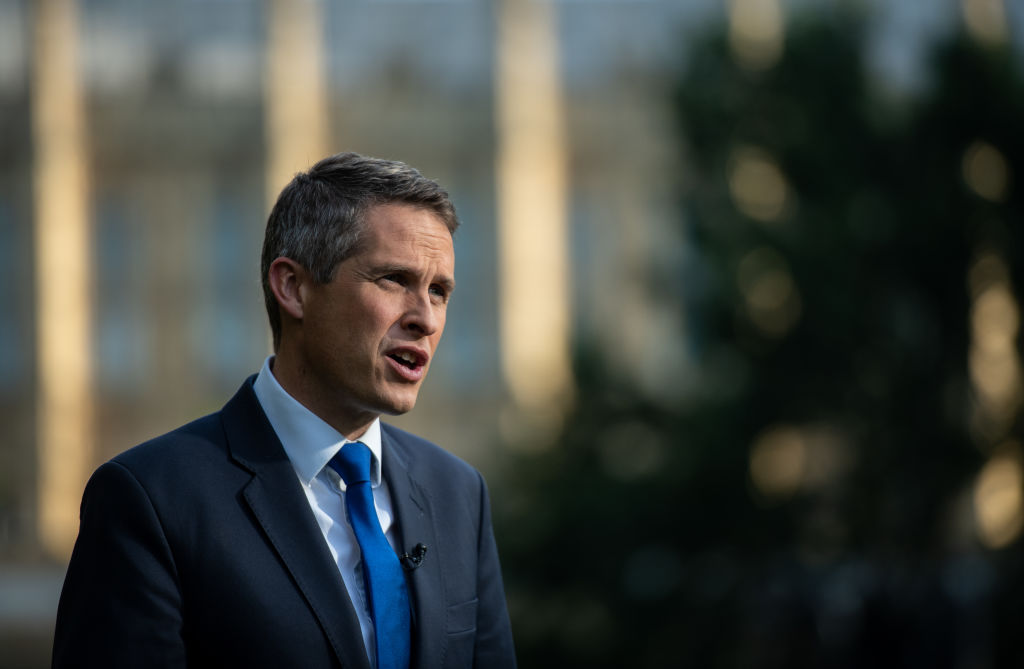‘Don’t worry, they won’t cancel exams again,’ I confidently assured my fifteen-year-old middle son shortly before Christmas. He was sitting his mock GCSEs, and fretting over how much they might matter, admitting: ‘I haven’t done enough work.’ Only a month ago, education secretary Gavin Williamson gave a ‘cast-iron guarantee’ exams would ‘absolutely’ go ahead in England. It seemed clear he and Boris Johnson had learnt their lesson. They’d not be so foolish as to do the same thing over again: pull exams without a proper plan of what to do instead. More fool me.
For my family – and for plenty of others in a similar position – it’s once bitten, twice shy. Last summer, my eighteen-year-old eldest son had his A levels axed and fake grades doled out instead. Those computer moderated grades were rejected by his two firm choices of Glasgow and Liverpool universities. His school told him to appeal and sent us home to enter clearing. He began ringing around, shellshocked, me scribbling notes and questions beside him as he tried, awkwardly, to sell himself. He started stammering that day on the phone. The stammer has stayed.
As Williamson and Johnson described the results as ‘dependable’ and ‘robust’ I felt like hurling something at the TV screen. Days later they reverted to Centre Assessed Grades (CAGs) with Johnson blaming a ‘mutant algorithm’, as though this was something beamed down from space, utterly unconnected to them. Now here we go again. My middle son’s GCSE grades might matter less, but they’re still important, especially since he wants to be a doctor.
As a governor at the two Ofsted-rated ‘outstanding’ non-selective state schools my boys attend in west London, I’ve also seen the monumental volume of work piled on teachers by this government’s rudderless education policies. Gavin Williamson acknowledged in the House of Commons on Wednesday that ‘exams are the fairest way of assessing a student’. He’s axed them anyway. But never fear; he has a cunning plan, so far advanced that no specifics have been given, but a consultation begins next week, with plans in place by late February. What have they been doing all this time?
Sure, it’s good they’ve abandoned the algorithm, and little wonder. A system so flawed that the protracted car crash of last August’s results could be seen coming a mile away. The Royal Statistical Society warned the exams regulator Ofqual of potential problems and offered advice last April. Ofqual turned them down. The result was chaos: 39 per cent of Centre Assessed Grades at A level were moderated down, but where five or fewer students were taking a subject the teacher’s assessment was automatically accepted. The vast majority of such small classes were in private schools; this was just one way the system deepened educational inequality.
But this week’s decision to ‘trust in the teachers rather than an algorithm’ brings with it a whole host of different problems. Last year that led to grade inflation. Teachers work incredibly hard and want, of course, the best for their students. But they are also human.
Predicted grades are wildly inaccurate even in normal times, and state schools are more prone to under-predict, especially with disadvantaged students. Last summer, some schools (my son’s included) were scrupulously careful in awarding grades; others abandoned similar restraint, and were rewarded.
The grades will need to be independently moderated. And what will they be based on? What are children to focus on for the next six months? How can any grade be remotely reliable unless it is based on a standardised test of some description? How can students stay motivated, stuck at home and with everything up in the air?
It all began to go wrong as soon as exams were axed on the 18 March 2020. For a government often rather late to act, this abrupt decision astonished me; students had covered almost the whole curriculum and were shortly to be sent home on study leave.
In otherwise empty schools, exams could have been held in safety with social distancing, using classrooms as well as sports halls. By June, restrictions were being eased and infection rates were falling.
Other countries coped better: Germany went ahead with the Arbiter tests, their equivalent of A levels. So did Hong Kong, while Spain and Italy both conducted adapted exams. It was possible.
It’s possible in 2021 too, especially now that we have a vaccine being rolled out. Exam boards have already reduced content: my son’s Lord of the Rings was dropped in favour of the shorter An Inspector Calls. Grade boundaries could have been adjusted so that a similar percentage of students were awarded each grade as in a normal year.
But no. It’s like the Emperor’s New Clothes; people might make a lot of noise about them but ultimately the grades weren’t real. They were made up. A confection. No one sat an exam. No one got the chance to show what they could do. My son’s grades rose when they reverted to his school’s judgement. Liverpool later offered him a place but by then he was settled on Swansea instead.
We’ll never know what he might have achieved. Students aren’t robots; some defy predictions and pull wonderful results out of the bag. Such students, who are often boys, were especially cheated.
I joked that if schools were closed again and exams pulled, I’d decamp to College Green with a placard. I haven’t. Yet. But profound damage is being done to children’s education, mental health and future life chances. Parents won’t forget this. I hope I’m proved wrong in August. But my current parent and governor assessed grade for the government’s handling of education is: F for fail. Must do better.






Comments